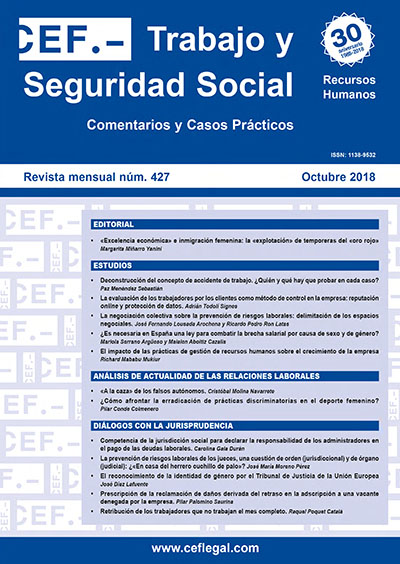On the hunt for the false self-employed: improving inspectorial action against fraud and financial stress in the Social Security
DOI:
https://doi.org/10.51302/rtss.2018.1520Keywords:
false self-employed, social security, digital platforms, RyanairAbstract
The necessary, and increasingly urgent, modernization of labor relations involves the adaptation of its legal regime to the digital transformation of our era. And in this intense and extensive process, in constant boiling and transition, it is already clear that the borders, always diffuse («gray»), between subordinate work and autonomous work, are increasingly liquid. One area that is especially responsible for this growing dilution is the one related to the «digital platform economy», but it is not the only one, insofar as other whole economic sectors, both traditional (meat, for example) and modern (low airlines cost, like Ryanair), show analogous tendencies (Judgment of the Court of the Social n. 1 of Tenerife of September 7, 2018, resources 164/2017).
The complexity of all this, and the need for legislative reforms, as well as new conventional experiences (collective regulations), give good proof of the recent regulatory initiatives in various
European countries (Italy, France, Denmark, etc.). It deals with both reducing the extreme conflict that is unfolding at this time in this regard as to promote greater legal security for users, workers and, of course, for companies. The insecurity and equivocity of the situation would be illustrated by the proliferation of judicial rulings, in all European countries, including now also Spain, which had maintained a certain critical «interpretative unity», which do not reach the same conclusion (Judgment of the Social Court n. 39 of Madrid, 284/2018, of September 3). Well, in Spain, the Government, instead of promoting appropriate initiatives that are up to the magnitude of the problem, has preferred to make a small reform of a regulatory nature and procedural sense (Royal Decree 997/2018, of August 3), in order to facilitate that the «superior body of labor police», the Labor and Social Security Inspectorate, can clear up any obstacles that may arise in its wake to bring out the «false self-employed workers». This would not only improve the anti-fraud figures, but would also alleviate, even slightly, the «financial stress» of the Social Security system, which in these days is also in serious or very acute condition.
Of all this, fascinating, still confused and unstable, current panorama of labor and social this analysis gives us account, formulating a critical chronicle of such movements. All this waiting for more certain normative, conventional and jurisprudential responses.
Downloads
References
Álvarez Montero, A. (2018). «Yacimientos de falsos autónomos» más allá de las plataformas digitales: ramificaciones de un arraigado problema. RTSS.CEF, 424, 113-132.
Bauman, Z. (2012). Vida líquida. Barcelona: Paidós.
Martínez Aso, M. (2018). Breve comentario a la modificación del RD 84/1996, de 26 de enero, por el que se aprueba el reglamento general sobre inscripción de empresas y afiliación, altas, bajas y variaciones de datos de trabajadores en la seguridad social. Habla la inspectora, y profesora, Mercedes Martínez Aso. www.eduardorojotorrecilla.es (06-09-2018). Recuperado de http://www.eduardorojotorrecilla.es/2018/09/breve-comentario-la-modificacion-del-rd.html (consultado el 25 de septiembre de 2018).
Miñarro Yanini, M. (2017). Contrato internacional de trabajo y «expatriados» de Ryanair: ¿Cuál es el «lugar habitual de trabajo»? Comentario a la Sentencia del Tribunal de Justicia de la Unión Europea de 14 de septiembre de 2017 (asuntos C-168 y C-169/2016). RTSS.CEF, 416, 169-178.
Miñarro Yanini, M. (2018). «Excelencia económica» e inmigración femenina: la «explotación» de temporeras del «oro rojo». RTSS.CEF, 427, 5-15.
Rojo Torrecilla, E. (2018a). Más sobre falsos autónomos. Lecturas recomendadas y una nota sobre los conductores de UBER que son trabajadores y tienen derecho a la protección por desempleo... en Nueva York (a propósito de la decisión del Unemployment Insurance Appeal Board de 12 de julio de 2018). (23-07-2018). Recuperado de http://www.eduardorojotorrecilla.es/2018/07/mas-sobre-falsos-autonomos-lecturas.html (consultado el 25 de septiembre de 2018).
Rojo Torrecilla, E. (2018b). La normativa francesa sobre la actividad de las plataformas de servicios y la relación jurídica con los prestadores de actividad para ellas. www.eduardorojotorrecilla.es (01-08-2018). Recuperado de http://www.eduardorojotorrecilla.es/2018/08/la-normativa-francesa-sobre-la.html (consultado el 25 de septiembre de 2018).
Todolí Signes, A. (2018). La evaluación de los trabajadores por parte de los clientes como método de vigilancia y control en la empresa: reputación online y protección de datos. RTSS.CEF, 427, 63-90.
Vandaele, K. (2018). Will trade unions survive in the platform economy? Emerging patterns of platform workers' collective voice and representation in Europe. Brussels: ETUI.


















